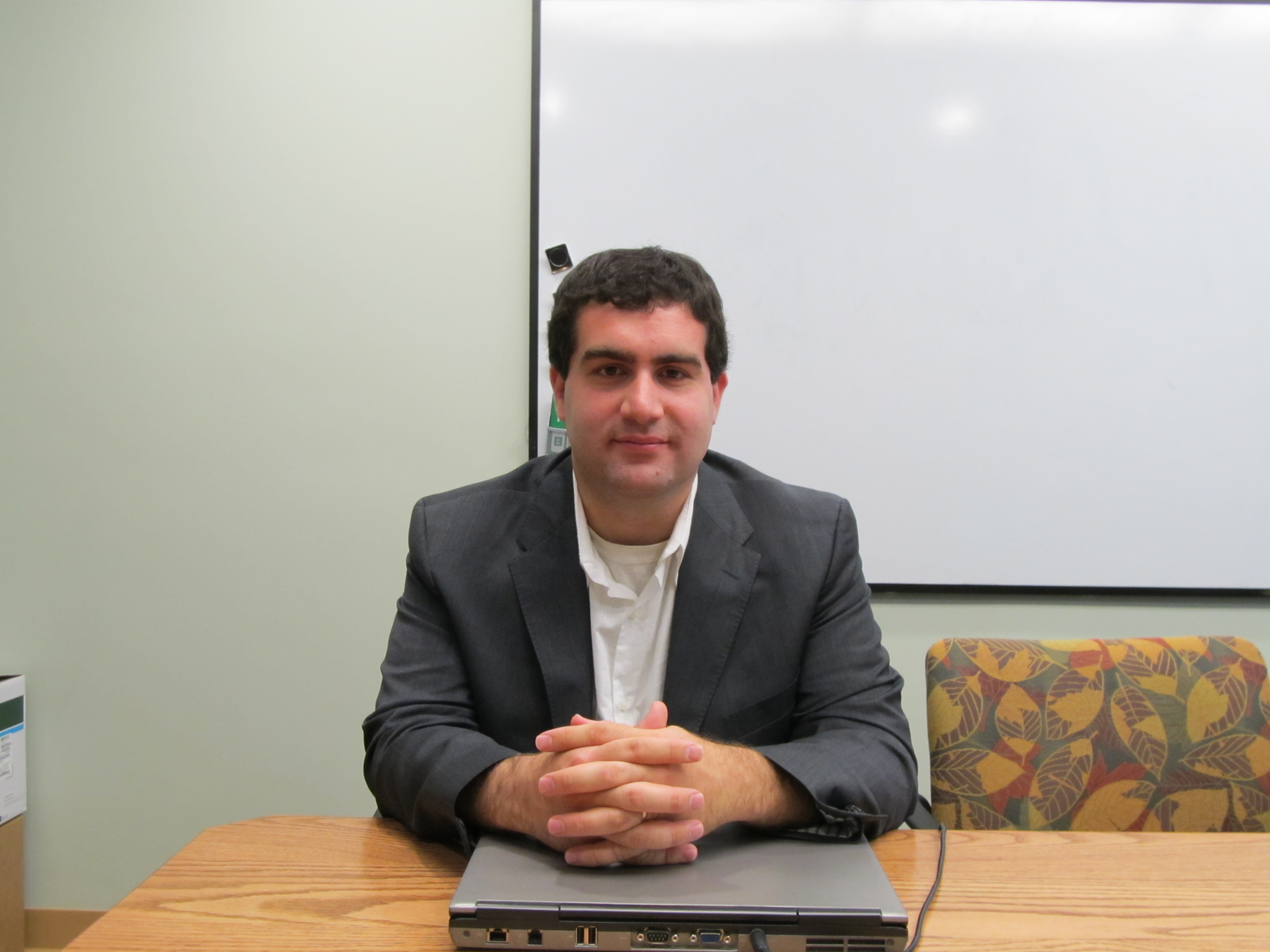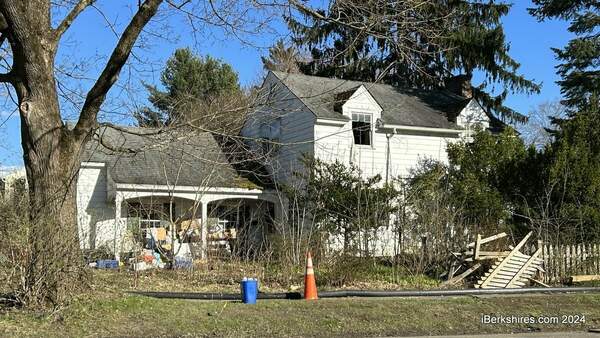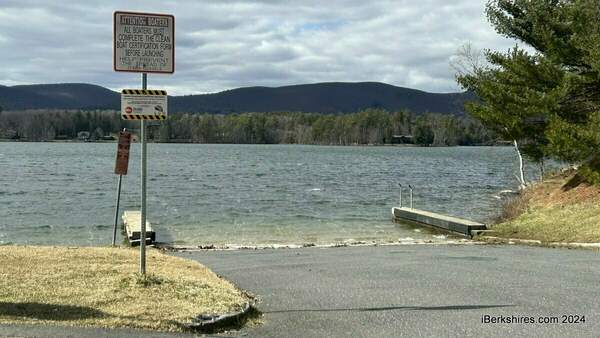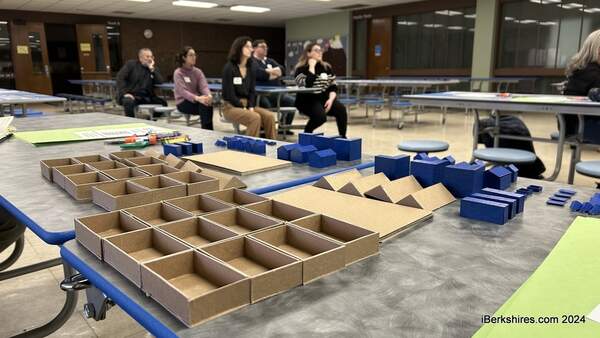Legislative Q&A: State Rep. Paul W. Mark
 |
The 2nd Berkshire District representative, who is running unopposed in November, will see his once sickle-shaped district shift to the east as a result of redistricting.
The Democrat moved from Hancock to Peru in anticipation of the change but doesn't see the new configuration as significantly changing how he represents his mostly rural district.
We sat down with Mark recently to talk with him about his first term in office and his goals going into his second.
The representative particularly touched on the redistricting process, the state's finances, wind power siting and the importance of locally targeted legislation to the small towns in his district. He's also hoping to make another pass at signature legislation that will promote cooperative business models.
Q: What were some of the highlights from this last Legislative session?
PM: Everyone I know talked about the health-care cost containment, that is definitely a big thing. The transportation bond bill was a big thing. We got that done at the last minute and it is good for us in our region because we got a lot of amendments in both our side and the Senate. In the final version that passed, we got $500,000 to acquire land for the rail trail to extend it from Lanesborough down to Crane Ave.
Sen. [Benjamin] Downing got maybe $2 million for the Woodlawn bridge in Pittsfield. We got money for the Schell Bridge in Northfield, which is a big thing they've been pushing for for years and we got $1.6 million for reconstructing Black Brook Road in Savoy. That's a town of 700 and they want to reconstruct the road because it is a major emergency route. But where does a town of 700 people find $1.6 million even to put up even in anticipation for the state to pay them later? It's too much to handle so, hopefully, this will help them out with that.
We did a job creation bill and one of the good things that got into that bill was the Community Development Partnership Act, which I was a cosponsor of. So, we have these community development corporations — we don't have one in my area of Berkshire County but we have one in Greenfield, the Franklin CDC, and we have one in the hilltowns, the Hilltowns CDC — and they go out and help small businesses. People may have an idea but they don't know how to market, don't have the technical expertise, they help put these people in touch with the resources. We got extra tax incentives, loans, grants, support for these CDCs included in the final jobs package.
We did court reform, which was early in the session so people don't really think about it. There was the big probation scandal and we completely changed the way that works.
The budget. When I was first elected, we were looking at a $1.5 billion deficit and we made that up without raising taxes. We did it without cutting major services. It is unbelievable. We are now one of three states in the whole country to have more than $1 billion saved in a rainy day fund and while the United States of America's credit was downgraded to AA+, ours went up. The state of Massachusetts went up to AA+, which saves people in our state millions of dollars in interest payments.
I remember running and we were talking about how the stimulus was ending and everyone was in a panic. We were very lucky we were able to come out of that better than most states in the country.
Q: Can you talk about the budget process and how did you accomplish that?
PM: The full budget process is gigantic. It starts in January when the governor and the secretary of administration and finance come up with a consensus revenue figures. This is what we anticipate revenue that we take in from taxes and fees will be in the coming year. From that point, the governor takes those numbers and he looks at what he feels his agencies need and he submits his budget proposal at the end of January.
Then it comes to us in the House and all revenue bills must originate in the house. It starts with the Ways and Means Committee and they have hearings all throughout the state. They had one at Berkshire Community College. The executive agencies come before us and they justify why they need what they need and we ask them questions. We go around. I have these office hours every month here at the Senior Center and I had a budget forum. People take that opportunity to advocate to their representatives and their senators what they feel the government's budget is lacking and what they think may be right on.
There was a big issue this last time with community colleges that they were going to take away local control. We stopped that and the fact that we went around and had these committee hearings, people had their chance to say why it wasn't working.
After that the House comes out with its Ways and Means budget. That happened in early April. We now have a chance to solicit more information and offer amendments we feel are important. At the end of April we have the actual budget debate, which is the big thing that everyone watches. It takes about four days from 10 in the morning to midnight some nights. And it's the week of my birthday so that is how I'll spend my birthday for as long as I have this job.
Finally we hammer out — through debate, through compromise — what the final House of Representatives budget is going to be. Then it goes to the Senate and the Senate does the same thing. We take the two versions over the month of June and they appoint three members of the Senate and three members of the House and they conference it together. They work out all the differences and we come back and vote on it. It has to be done by July 1. I think we finished it on June 30 this year.
The governor vetoed some of it and we can override it. He vetoed funding for Taunton State Hospital and we overrode him and there were a couple of other things. It is actually a six or seven month process and it takes up about a third of the work we do. I didn't know that before I was elected and I don't think a lot of people realize that.
Q: How exactly did you overcome the deficit without raising taxes or fees?
PM: Some of it was the fact that in Massachusetts, the economy started to recover better than the rest of the nation. Our unemployment rate is only 6 percent whereas the national is over 8 percent. Because of that our revenue figures came in much better than expected. Before I was elected, there were cuts being made to respond to the crisis. But at the same time we had the stimulus money coming in to balance it. With the stimulus money now gone, the revenue increased and we were able to work from the higher revenue projections, which was good. Our budget must be balanced so if you are taking in more money, you have to either spend it or save it.
Then we took a substantial amount of money out of the rainy day fund in fiscal year 2011 and in fiscal year 2011 we funded local aid at a level fund with the provision that if the revenue came in high enough, it would be level. If the revenues did not come in high enough, it would be cut by $65 million. We took a just in case approach and in the end it did come in higher so we were able to level fund.
Then there were efficiencies and cost savings that were found in health care and there were other savings that were attempted. The governor attempted to cut the Adult Day Health Program but we stopped it. The people in the program got in touch with us and I went and I saw firsthand how important it was and how it would save money in the long run. That was something that was not getting cut. I mention that because something you try something out as a governor and you see will it work or will it not work.
It was a mixture of the economy improving, savings being found and using the rainy day fund. In fiscal year 2012, it continued to go up and the saving we received with our bond rating going up and pension reform legislation, we were able to put money back into the rainy day fund.
Q: Let's talk about your role in this session. Which bills were you advocating for? What were your committee appointments?
PM: First the committee question. I was appointed to the Mental Health and Substance Abuse, Higher Education and Environment, Agriculture and Natural Resources, which were two of the three I asked for. Agricultural is very important to the region, Higher Education is very important for the region and while I didn't ask for Mental Health and Substance Abuse, I am glad I was placed on it because it is so important — as we are seeing with everything going on lately in the methadone clinic and the opioid problem in Berkshire County and throughout the state.
As far as bills I sponsored, my signature bill did not pass, which was a bill to encourage the use of cooperatives and employee stock ownership as a better business model. It takes away from the traditional corporate model where maybe things aren't going so well and the company moves to China and takes all the jobs with them. A cooperative or an employee stock ownership plan would be a better partner with the community, more willing to stay and more heavily invested in the success and location. That bill got out of the Labor and Workforce Development Committee, which was a big thing, and it got all the way to the committee on the bills in third reading — the last step before it gets passed. It's not bad right out of the gate as a freshman.
I am going to go to the Labor and Workforce Development Committee and the speakers office and see if maybe people have ideas on how we can clean up the language, make it more palatable and make it into something that can pass in the next session.
In the budget, a companion piece to that is the Executive Office of Employee Involvement and Ownership, that has been zero funded since the crisis began and each year I proposed amendments for just $200,000 just to get people working there and get them back in business. I am going to try again. So far, it has stayed at zero for the last two years but I think maybe next year if the economy keeps coming back and the revenue picture is improving, maybe we will have a chance to get that into the final budget next year.
Q: Tell me about that cooperative bill. How does it work?
PM: It asks that a company that is going to leave the country and go out of business that they let the employees know that you have the right to change the business model and buy the company. It increases education and it lets people have access to information they need. It is a viable option. Instead of just leaving and packing up, maybe the employees themselves can get involved and keep the business locally.
But there were other bills, too. People don't think a local bill is that important when you are reading a newspaper but when you have 22 towns, you get a lot of them and it is important to them. One that I was really happy about was we were able to name a bridge in Dalton after Michael Casey, who was a Marine that got killed in Vietnam in 1968. For 40 years his family has been trying to get this honor for him and finally we were able to get it this summer.
We got a land taking in Hinsdale. They are rebuilding the bridge on Route 8 for the railroad tracks so they needed to swap land between the Department of Fish and Wildlife and the Department of Transportation. It turned out the town got extra land, the town got money out of it and everybody was happy. It was one of those things that had to be by roll call vote and it came to us in late June. Somehow we got it done in six weeks.
Just yesterday in informal session I had a home-rule petition in Northfield pass. It is the ability for them to recall their selectmen. They've been pushing me on this for about a year now so that was good. Route 9 is right now called the United States Marine Corps League Highway from Pittsfield to Northampton. There is no such entity of the United States Marine Corps League so they want to change it to the Marine Corps League Highway and that has passed through the Senate and it is now in the committee on third reading in the House. So, I am hopeful we can still get that done.
The town of Hinsdale wants to rename Route 8 the Private John's Highway. These are all small things, they are not glamorous but they mean a lot to different people. In this job, a third of the time you are working on the budget, a third of the time you are working on big policy issues like health-care cost containment and a third of the time it is constituent stuff. It's someone who needs help with their unemployment insurance or the registry is not getting back to them and they need their car registered by a certain date or a town is looking to rename a highway.
Today in my email people are looking to put sound barriers up on the turnpike in Becket. Little things like that but they are very important to people.
Q: What did you want to see action taken on but did not other than the cooperative bill?
PM: I wanted the bottle bill to pass. I was disappointed that that didn't happen. I thought we got pretty close and I know there was a lot of support especially out in this region. I wasn't very happy about that. There was a Chapter 70 adequacy bill that I was a co-sponsor of to make sure that the foundation budget for schools is being funded at the proper amount and I don't think that happened. I offered a tax credit for the use of biodiesel and that didn't happen either.
Q: Your district was switched up. How did that change your role?
PM: The redistricting process took up about 10 months of my first year. That was a big issue. They had a hearing here in Pittsfield, they had a hearing Greenfield. They had a lot of constituents. We were really afraid we would lose one of our seats here in Berkshire County and we would go down to three and this seat may reappear in southern Worcester area or in Boston. We lost population here. Also adding to our burden was that we were short a member of our delegation. Christopher Speranzo [former 3rd District representative] left and he was our member on the redistricting committee. We didn't have an actual, physical voice on that committee.
Still we put differences aside. Rep. Steve Kulik, he is out of Worthington in Hampshire County, Smitty [Pignatelli], myself, Gail [Cariddi], Sen. Downing, we did everything we could to make sure that this region and all three counties didn't lose a voice. There are nine people that represent Berkshire County, Hampshire County and Franklin County. The city of Boston has 18, Worcester County has 17, Middlesex has 37. Losing one voice is devastating.
In Congress, we did the best we could. Unfortunately, the state lost a seat, which is never a good thing. We kept two seats through — the new 1st Congressional and the 2nd Congressional district. They are still rural so they can't be ignored. Berkshire County can't be ignored by any congressman from Springfield in the future. A congressman from Springfield will have to campaign in Berkshire County. Half of my district is now in the 2nd Congressional District so Greenfield and Northfield can never be ignored from a congressman from Worcester. You can't just take the Pioneer Valley for granted and that was very important.
When we talk about what is important our here, it is that Boston ignores us all the time, make that stop happening. We did the best we could with the redistricting. I am happy with my new district. My old district was Berkshire and Franklin County based and it still is. The towns have changed a little bit.
Q: How did that change the way your schedule and the concerns?
PM: It didn't change that much because I had 10 towns in Franklin County as it was. I just had 12 in Berkshire before. All that has changed now is that I have the town of Greenfield. It's 17,000 people and it has its own issues. It is a small city like North Adams. The good news for me is that I had to spend a lot of time there anyway because it was the county seat. Like in Pittsfield, Gail doesn't have Pittsfield but she ends up at a lot of events there because it is the heart of the county. It's the same thing with Greenfield. Even when I was campaigning, I had campaign events there.
Since the change has happened, I always do these roving office hours. ... I do every Monday in Greenfield, every Tuesday in Dalton and every Thursday in Northfield so it's just keeping in touch. People are happy when they see you.
When you have 22 towns, you can't be there at every single event but when you make the effort and are at everything you can possibly be at, people seem to appreciate it.
Q: Which bill are you most proud of?
PM: I am proud that the Citizens United resolution passed, I was a co-sponsor of that. That was something important to me. I am proud that the human trafficking bill passed early in the session, I was a co-sponsor of that, too. That was important to me. This isn't a glamorous one but in collective bargaining for public employees there is a thing called the "evergreen clause" that was the law of the land since the '50s. The [Supreme Judicial Court] ruled in 2010 that you are no longer allowed to do that. The evergreen clause is if the state and a union fail to get an agreement by the time a contract expires, you just keep working under the old one. It happens in private sector, it happens in the public sector. The court struck that down and we were able to get that back into the law.
I am actually proud of the redistricting process not because we were able to save our seat but because it was highly acclaimed. In 2000, there were a lot of problems. The redistricting process is what led Speaker Finneran having to leave. In 2010, we won awards for being the most transparent, the most open redistricting in the country. That says a lot to the way the process was conducted.
The jobs package is going to be good. We passed an act relative to electricity, the energy bill and that was good. It was good because not only did it expanded credits and opportunities for solar energy, it was good with what we kept out of it — the wind siting reform act. That is not popular in this area so we were able to keep that off the agenda for the entire legislative session. A lot of people were afraid that it would get snuck into the energy bill at the last second. I got a lot of calls, a lot of emails. My district is basically ground zero for a lot of these wind projects and I was very pleased we were able to keep out of it.
Q: What do you think is going to be the most important to the people in your district?
PM: People will be happy with the wind bill because it is not going to happen. I think in the long term people are going to be happy with the health-care costs containment if it works. It is estimated to save $200 billion over the next 15 years and if it works out the way we think it is going to, that is going to be amazing. Health-care costs are like one-third of our state budget now, which is just out of hand. If that keeps growing and growing and growing, there isn't going to be money to pay for anything else. I'm hoping people will see results out of that. I think the jobs bill is going to be helpful. We are already ahead of the nation and I think it will keep us on pace to stay ahead of the nation.
I think we are well prepared for the future when it comes to fiscal matters. Having over a billion dollars saved is so important right now. We have no idea what is going to happen with the federal government. If this election, the national election, comes out and it is basically another tie like it was in 2010, we might have two more years of stalemate, two more years of nothing happening, of funds not coming back to our state. We're ready for that. International events now affect us. We're always watching over in Europe, is it going to crash? Is it going to fail? Is Europe going to be thrown into turmoil? If that happens, again, we are as well positioned as we can be as a state.
And nobody noticed it but our income tax actually went down. It went down by half of a percent. When the people voted to reduce the income tax from 5.95 percent to 5 percent in 2000, there was a formula in place where when benchmarks were hit, the income tax would slowly come down. It came down in January but I don't think anybody noticed it because it is like $20 in your check. But it is something tangible.
Q: What is on the agenda for next session?
PM: The big thing that everybody is talking about is going to be transportation. We're looking at overhauling the way transportation is funded, transportation infrastructure as well as public transportation services. That's going to be gigantic. It's going to be a major debate.
Locally at the Dalton Town Hall, they are looking to put an elevator in, in Greenfield they are looking to build a $5.5 million parking deck downtown. The Franklin County Courthouse is going to be under construction in the near future and they are looking right now where they will house these employees for the next three to five years. I want to get that cooperative bill moving again.
At the least, if we are able to get that money to fund the Office of Employee Involvement again, I think that is huge. It is going to be a resource for people that are looking at alternative means to starting or keeping a business local. Local business, local agriculture, those are all buzz words now. Everybody wants to be local because we don't want to buy stuff that was made for 2 cents in China. We want to know that our food is fresh.
This is the fourth in a series of conversations with members of the Berkshire delegation.
Tags: legislators, Mark, Q&A, representative,















